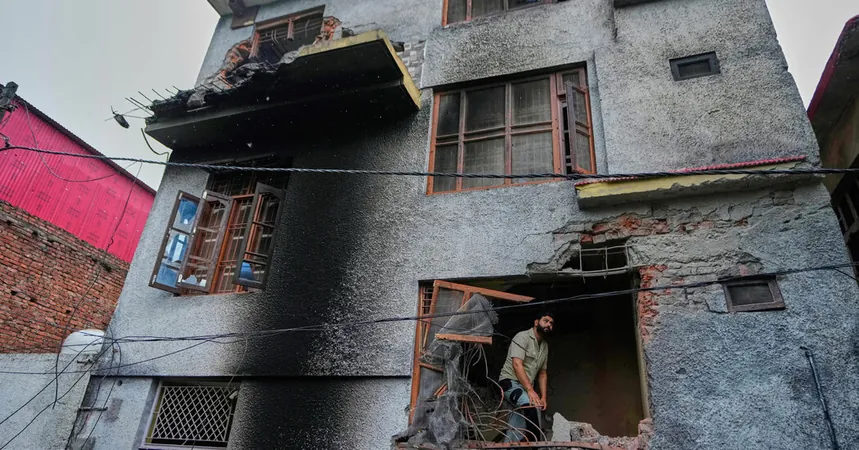
Tensions Skyrocket: India and Pakistan on the Brink of War After Heavy Clashes
2025-05-08
Author: Kai
The volatile situation between India and Pakistan saw new heights of tension on Thursday, with reports of intense overnight shelling and airstrikes complicating international diplomatic efforts aimed at preventing an all-out war.
Wednesday's outbreak of violence began with Indian airstrikes and Pakistan claiming to have downed Indian aircraft, resulting in significant casualties on both sides. In a surprising twist, both nations appeared willing to discuss potential de-escalation despite their rhetoric of victory. Pakistani officials revealed that initial communications were reestablished between security officials from both countries.
U.S. President Donald Trump also expressed a keen interest in mediating, with American officials actively engaging both leaderships to seek a peaceful resolution to the mounting crisis.
Amidst the chaos, some glimmers of optimism emerged on Thursday, characterized by a series of diplomatic meetings in both New Delhi and Islamabad. Key diplomats from Iran and Saudi Arabia, essential regional players with strong ties to both nations, were present in New Delhi for crucial discussions.
The European Union issued a statement, expressing deep concern over the escalating tensions and the potential loss of civilian lives. They called upon both countries to de-escalate and halt further military actions.
However, reports from the frontlines painted a grim picture as violence continued unabated. India reported heavy shelling from Pakistani forces, while claiming their military retaliated, targeting Pakistan's air defense systems. Pakistan countered with claims of downing Indian drones that intruded into their airspace.
In a stark warning, the U.S. issued a safety alert for American citizens in Lahore, advising them to shelter in place due to reported drone incidents and heavy military activity in the region.
The long-standing hostilities between India and Pakistan trace back to their separation at the end of British colonial rule in 1947, with the Kashmir region being a constant flashpoint.
Despite the initial steps towards dialogue, both nations remain on high alert. Pakistani officials confirmed that the national security advisers were having some indirect interactions post-violence, as stated by Foreign Minister Ishaq Dar.
In New Delhi, Prime Minister Narendra Modi's government briefed opposition leaders about the military operations, which received unanimous support from political figures. India's parliamentary affairs minister emphasized, 'This is an ongoing operation,' showcasing the status quo.
Indian Foreign Minister S. Jaishankar, during his meeting with his Iranian counterpart, clarified that India's military responses to Pakistani actions were 'targeted and measured' but warned against underestimating their resolve should they be attacked.
Meanwhile, in Pakistan, images of a funeral of a seven-year-old boy killed during the Indian strikes dominated media coverage. Top leaders, including President Asif Ali Zardari, attended, condemning India's actions as 'cowardice' and promising decisive retaliation.


 Brasil (PT)
Brasil (PT)
 Canada (EN)
Canada (EN)
 Chile (ES)
Chile (ES)
 Česko (CS)
Česko (CS)
 대한민국 (KO)
대한민국 (KO)
 España (ES)
España (ES)
 France (FR)
France (FR)
 Hong Kong (EN)
Hong Kong (EN)
 Italia (IT)
Italia (IT)
 日本 (JA)
日本 (JA)
 Magyarország (HU)
Magyarország (HU)
 Norge (NO)
Norge (NO)
 Polska (PL)
Polska (PL)
 Schweiz (DE)
Schweiz (DE)
 Singapore (EN)
Singapore (EN)
 Sverige (SV)
Sverige (SV)
 Suomi (FI)
Suomi (FI)
 Türkiye (TR)
Türkiye (TR)
 الإمارات العربية المتحدة (AR)
الإمارات العربية المتحدة (AR)